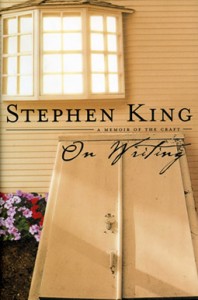Adding to my pervious post: Note to Self (1/2) here are more note on On Writing by Stephen King.
Plotting
- Stephen King distrusts plot
- Lives are largely plotless
- Plotting and spontaneity of real creation are not compatible
[ I feel the same way. When I’m forced to turn in a plot, I feel my characters are puppets/flat/dead when I want the characters to tell me where to go and they have the right to change their minds. ] - Stories are found things and writers discover and excavate
Description
- How-to + how-much-to
- Must learn from reading and writing a lot
- First visualize what you want readers to experience, then transcribing it into words
- begins in writer’s imagination but should finish in the reader’s imagination
Theme
Ask yourself
- Why bother writing it?
- What is it all about?
Writer’s job
- 1st draft (during/just after): read over and decide what it is about (might be hidden until now)
- 2nd draft: make the theme even more clear
Revision
2nd draft = 1st draft – 10% (word count)

